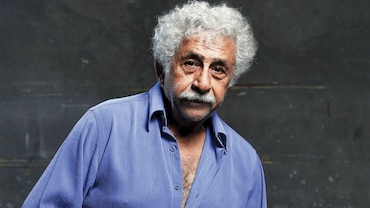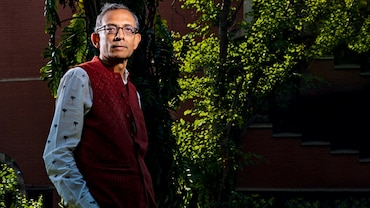The Ever Beloved Mr Bond
In conversation with the grand old man of Indian storytelling
 photo by: Sandeep Sahdev
photo by: Sandeep Sahdev
Few writers can make the old mountains sing like Ruskin Bond. His timeless stories have introduced countless readers to the mountains of Garhwal, its tall deodars, and to the lively characters and ghosts that people his Himalayan universe, transporting readers back to simpler times. As a writer who seems endlessly delighted by children and their world, Bond’s writing is bracingly real, often relaying the knottiest ideas about loss and loneliness in granular detail that resonates across ages. Reader’s Digest spoke with the grand old man of Indian storytelling over a lively phone call, just after his 87th birthday last month.
Your first book was published when you were 21—almost right after school. At 87, you are writing still. Is it safe to say that, for you, the joys of writing outweigh the anguish?
Oh yes! For me there is no anguish to writing at all, or I wouldn’t be writing. I like to enjoy my work and I think I have succeeded. That’s why I have been able to continue writing without a break for 70 years. I was 17 when I wrote my first novel—it took me a couple of years to find a publisher. Over the years there have been lots of ups and downs but I have kept going simply because I truly love writing. And I have been fortunate in that, for most of those 70 years, I have been able to make a living off it. To be able to live off doing something you enjoy, that’s what makes it so worthwhile for me.
Much of your work draws heavily from your own life. Is it good writing advice to say that people should stick to writing what they know? Or could that potentially be limiting?
No two writers are the same. The subjective writer is someone like myself, who writes a lot about his or her own life—about the people you know, your own experiences. Emily Bronte wrote passionately out of her own life. On the other hand, you’d get the objective writer, someone who is a good storyteller, like a Somerset Maugham, a Dickens or a Balzac who writes about people rather cynically and could tell a good story but won’t tell you much about himself really. So, there is room for all kinds of writers and I wouldn’t say one is better than the other.
How do story ideas come to you? Do they sail in unannounced, or is there some sort of method you follow?
In different ways. For one thing, the longer you live, the more memories you have—provided your memory is good. You’ll have met so many people and seen so much happen around you. You pick up little anecdotes here and there and then you can develop them. I keep a notebook, where I put down ideas and thoughts that I might not use immediately, but they may come in use some time. I also keep a dream book. When I have an interesting dream, I make a note of it. I don’t try to interpret the dream—I’m no Freud. He got it all wrong anyway!
Stories and characters can sometimes take on a life of their own. Have you ever been surprised by one of your fictional creations? At their trajectories or final forms?
Sometimes a character can run away with you—actually, they usually do. Very often I will start with an episode but when I start writing it, the story will go on in a different direction, a character will change. One of my early stories called The Woman on Platform Eight is based on a memory of being stranded at Ambala station on my way to school in Shimla when I was eight or nine. I was on my own, feeling lost. A lady came up to me—she had her own son with her—and she was very kind. When the next train came in, she put me on it. In the story version, I tried to explore why she was being so nice to me, and started seeing her as a sort of substitute mother, imagining that she perhaps had a small boy or girl, whom she lost. I ended up creating a sort of mother–son relationship there. But all that hadn’t really happened. When I was writing, I could just remember this person’s kindness. So sometimes the story carries you away towards something quite different from what you set out to do. Not always, but often.
 Bond at a meet-and-greet in Mussorie with his young fans, in pre-COVID-19 times.
Bond at a meet-and-greet in Mussorie with his young fans, in pre-COVID-19 times.
The natural world is a consistent and important participant in many of your stories. How would you describe your connection to nature?
Like most of us, I took nature for granted when I was boy and in my twenties. It was only when I got older and came to the mountains that I came closer to nature. For about 10 years, I lived near the forest above a mountain stream, surrounded by different trees, birds and small animals that came there. The stream was just about a 20-minute walk down the hill and I would visit it quite often. So, daily life changed considerably. It came into my writing more and more as time went by. Today, whatever I am writing, the natural world comes into it, even though for the last year and a half I have been home-bound like everyone else. Most writers write from home anyway. I have been fortunate in the sense that this current catastrophe hasn’t stopped me from working, as it has so many people.
You’ve been quoted as saying that as a boy you wrote for adults, and for children once you were grown. How and why did that happen? Was it a conscious shift? Which do you enjoy more?
That’s true. Although as a boy, I was writing for adults, or rather for the general reader, I was writing about childhood—my own, or that of boys and girls I knew—and about friendship. It’s only when I was about 40 that I started writing stories specifically for children. Since I was quite at ease writing about children, I could now write for them too. It happened quite accidentally: I wrote a sort of novella called Angry River and sent it to a publisher in England and the editor there said, “Mr Bond, this is too short to be published as a novel for adults, but if you could make a few changes, we could make a great story for children.” I did that and it worked.
Day to day, what does a disciplined writing routine look like for you? Is having one important to the writing process?
It helps to be a bit disciplined. I don’t tie myself down to any particular time of day, and sometimes two or three days may pass, without my having written anything. But it is nice to be fairly regular. If you keep missing out, then you are inclined to get a bit lazy. And you get used to a certain time of the day. For me, it is fairly early in the morning, after I’ve had a cup of tea. The sun comes into my room, it’s bright and cheerful and I will sit at the desk for half an hour or an hour at the most. For the rest of day, you feel happy that you’ve done something. If, in the middle of the night, I wake up with a great idea, I switch on the light and jot it down. It will come in use later on.
Do you use a laptop to write?
I don’t use any technology. I still write by hand. In fact, I’ve got fairly decent handwriting, so the publishers don’t complain too much. I enjoy writing by hand. There is something fairly sensuous about it—the feeling of the paper, the pen. When I was younger, I used to type but [typing] gives me a stiff neck now. I wouldn’t be able to write very long, hunched over anything. And I rather like the business of holding a pen and watching it flow against the page, the words coming to life in nice purple ink. I use purple ink.
That’s quite specific!
Well, I must confess the ink doesn’t make me a better writer! But, long ago, I was in love with this girl in Delhi. She and I used to go to India Gate and eat jamuns. There were those jamun trees there—lovely fruit that stain your lips purple. Purple was my favourite colour, and she would ever so often wear jamuni dupattas as well. So I feel a bit nostalgic when I use jamun-coloured ink.
 Ruskin Bond, with his family at home in Landour, Uttarakhand
Ruskin Bond, with his family at home in Landour, Uttarakhand
V. S. Naipaul said that no one quite writes about solitude the way you do. What distinction do you draw between loneliness and solitude? Did writing ever leave you lonely?
Writing doesn’t, but I’d say that loneliness is, of course, in a way thrust upon us. We are never looking for it, it’s not something you enjoy. Solitude on the other hand, we seek. A writer, particularly, wants a certain amount of solitude. You can call it a matter of temperament—not everybody enjoys solitude. I was a lonely boy. I lost my father when I was 10 and had to adjust to a stepfather and a completely different life. I’ve since learnt to cope with loneliness, while at the same time appreciating being alone sometimes. I think, as someone who makes a living as a writer, an artist of any kind would need solitude from time to time. It helps you in your work, you can be more reflective. In a way, you are communing with yourself.
You’ve often said that you are an Indian not only by birth, but by choice. Did India ever force you to look at yourself as the ‘other’?
Yes. I went to England after finishing school, but I could never feel at home there—I was always longing to come back. India was very much in my blood. I missed everything I had known as a boy, from friendships to the things that I could write about like the monsoon rain, dust storms and mangoes in season—everything that was India. These were things I couldn’t write about sitting in a room in London. Apart from being happier here, you can never run out of stories in India. But I guess at times I did feel like the outsider looking in over the years. Some people see me as an outsider of sorts, because obviously I am not everyone’s ideal of an average Indian. But the thing about India is that over centuries, all sorts of people have come and made their home here and become Indian—even though they might have been something else before. India is a wonderful—and at times troublesome—mix of ethnic, racial and religious and language differences of all sorts, which, at times, makes for problems. But, by and large, it also makes for some sort of homogeneity in itself. It’s a land of contradictions. You wouldn’t get anything like it anywhere else in the world. It is different and I think we should appreciate that difference.
One assumes anybody who has gotten to your age has been knocked around a bit. With time, do you find yourself developing a growing pessimism about the world?
At times. As we get older, we become a little critical of the changes that take place. We don’t like change so much, but one has to accept the world is going to change—some things change for the better and some for the worse, I would say. We have to sort of balance them together. At times, I am pessimistic, and at times I feel, well, it’s not such a big, bad world after all.
You have a phenomenal body of work, dating back several decades. Was it hard to pick the stories in your latest collection (All-Time Favourites For Children)?
This is a selection of some of my more popular children’s stories. I’ve added three or four new ones, so the reader won’t complain. And while making the selections, I tried to include a few that aren’t so well-known. This new book is a blend of what’s popular, what I like and a couple of new ones.
 Ruskin Bond, who turned 87 in May rang in his birthday with a new book.
Ruskin Bond, who turned 87 in May rang in his birthday with a new book.
For an Indian kid reading in English, you are essential reading. Who are some of your favourite writers and what are you currently reading?
I am reading a lot—much more than I normally do. Sometimes I read old favourites—I like going back to books I have enjoyed before. I also read quite a lot of current writing. I am just finishing this book that I couldn’t put down, called An Officer and a Spy by Robert Harris. I’ve read half a dozen of his novels recently. I have also been reading classical ghost stories by writers like M. R. James, Edith Wharton, Oliver Onions, Algernon Blackwood. Kids often send me books—very sweet of them. They send me books I’ve read because they might find a story or memoir of mine in which I say one of my favourite books is Alice in Wonderland. Over a year, I have received six copies of Alice in Wonderland. The good thing is that usually the illustrations are different, so I have something different to look at.
I cannot resist a cliché: What advice would you give budding writers?
For people or children who want to write but have problems with language, the best way to improve is to read more—read well, write well. So many people want to have their name on a book, or feel they have got a book in them that they dash off sometimes without any regard to the language itself—not just the rules of composition but a feel for the language. Be patient and work on your writing. Be professional about it rather than rushing into print just to say you’ve written a book. In the long run, it will pay off.
After writing for almost seven decades, do you sometimes not want to put your feet up and relax?
I have my feet up right now and I am relaxing! There is a heater on in front of me—we’ve had a lot of rain and it’s a bit cold today. A cup of tea is just being made for me, along with a ham sandwich.
That sounds wonderful.
See how well I am looked after!






